All France coaches, with the exception of Bernard Laporte, sooner or later resemble despondent secondary school teachers, driven demented to the point of indifference by an unresponsive class.
Jacques Brunel looks like he arrived at that stage a long time ago.
In many respects, Brunel is a classic France coach, a kind of nothing figurehead distinguished only by an admirable commitment to perversity in selection.
Like a number of his predecessors, he appears to have taken a solemn vow to mess with his players' heads whenever possible.
Against England, Brunel decided that this business of picking players in their best positions was far too 'basic' for a man in his role and that it behoves the France national team coach to act in a more enigmatic fashion than that.
In that cause, he decided to play two centres on the wing and a winger at full-back. The results can be fairly described as catastrophic but Brunel wasn't inclined to come over all introspective in public afterwards.
"There is nothing to say. The match was over at half-time, bravo to them," was his less than expansive reply to inquiries about his idiosyncratic team selection.
We need your consent to load this SoundCloud contentWe use SoundCloud to manage extra content that can set cookies on your device and collect data about your activity. Please review their details and accept them to load the content.Manage Preferences
Much was made of the fact that the week before against Wales, Sebastian Vahaamahina, who generously threw that cow-pat of a pass in George North's direction for the visitors' winning score, was unaware he'd been installed as captain in the closing stages until addressed as such by Wayne Barnes. The coaching staff had felt no urge to tell him.
"I did not even know I was captain. It was the referee, Wayne Barnes, who came to see me on a penalty to ask me my choice. I told him to address the captain; he said it was me. The staff did not warn me."
In many respects, Brunel is a classic France coach, a kind of nothing figurehead distinguished only by an admirable commitment to perversity in selection.
The day after the England loss, memes started appearing of Yoann Huget in tribute to Vahaamahina.
"I did not even know I was a full back. It was the winger Jonny May, who kept touching down in the left hand corner, and I asked him, where is our full back? He said it was me. The staff did not warn me."
This was intended as online bantz but the revelations slipping out of the camp indicated it may have been closer to the truth than many might have thought.
"It was chaos. No one knew which position we were playing in. We were lost on the pitch and had to try and ask the bench," one player told the media afterwards.
The French rugby team are one of the most heavily romanticised outfits in sport. This is what accounts for all the hipster-ish keening at their demise. There is no shortage of 'French Flair Rugby' videos on Youtube and the comment sections underneath have lately been full of nostalgic lament. 'Never see their likes again', 'French rugby RIP', etc, etc.
This reputation is primarily a legacy of their 1980s team, specifically the team with Serge Blanco, Phillipe Sella and Patrice Lagisquet (the Bayonne Express!) in the backs.
They won Grand Slams in 1981 and 1987, a championship outright in 1989, and three 'shared' championships (totting up points difference was for tedious bores) in 1983, 1986 and 1988.
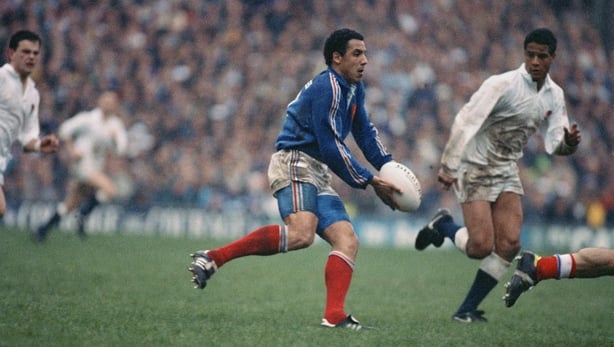
No team had a worse record against them than Ireland.
Moss Finn scored two tries in the 22-16 win over France in Lansdowne Road in 1983. That was Ireland's last win in the fixture in the 20th century.
You may not have known which French team was going to turn up but you could be guaranteed whichever of them would beat Ireland.
Away games were the worst, with Ireland failing to even score a try in the Parc des Princes between 1980 and 1996. The breakthrough seven-pointer, when it finally arrived in '96, was hardly a thrilling catharsis. Referee Ed Morrison awarded a penalty try with the scoreline at 45-3 to the hosts.
Two years later, Denis Hickie did score in slightly more glorious fashion, giving Ireland a shock first half lead with an interception score. After the game, the last Irishman to score in Paris, Freddie McLennan, rang Hickie and said "You're some b******s, nobody remembers me apart from that try and now nobody is going to remember me ever again."
France-Ireland games usually gave rise to this kind of classic self-deprecating Irish rugby anecdote. Typical example - at some pre-match dinner in the 1970s, the head of the French federation expressed his hope for a good game and announced "may the best team win." Seated at the top table, Irish captain Willie John McBride - a ubiquitous presence in such anecdotes - was heard to mutter "Jaysus, I hope not."
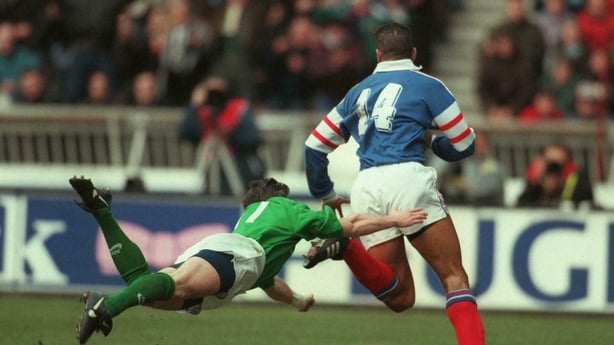
The French continued to win in the 90s and 00s but in a less flamboyantly satisfying manner. After the 1993 Five Nations, which France won in more humdrum fashion, and partly thanks to Ireland beating England in Lansdowne Road, coach Pierre Berbizier was hectored by purists unhappy with the manner in which the victory was achieved.
"Berbizier deserves better than to have to face a tribunal of style counsellors disaffected with the manner in which France have won the cup," wrote Paul Hayward the day after France's final weekend win over Wales.
But then, as is clear from crowd reactions at the Stade de France and Rolland Garros, the French audience are a demanding lot.
They'd boo a children's Christmas play if the shepherds didn't play their parts with the requisite gusto.
This makes it hard to figure how they've tolerated France post-2011 World Cup. One would have presumed they'd have been shamed into turning a corner by now, that the embarrassment of the 2012-15 World Cup cycle would have roused them to do better. But no, the crisis continues to deepen and extend itself. There's been the odd false dawn but fewer and fewer are conned by them anymore.
There's an abundance of theories explaining the morass. One is that the French rugby psyche is ill-equipped for what professional rugby has become.
France seemed to fare better in the more carefree, anarchic days when their hang-loose, improvisational style allowed them to prosper against stodgier outfits.
But they can't get with the present Joe Schmidt era of forensic analysis, granular detail and tightly written battle plans.
Their diligence and capacity for unglamourous work, among the backs at least, is said to be lesser than your average Irish professional.
The Damian Penaud who ran forward with the ball in his hands against England was evidently a different individual altogether to the Damian Penaud obliged to run backwards on Jonny May's opening try.
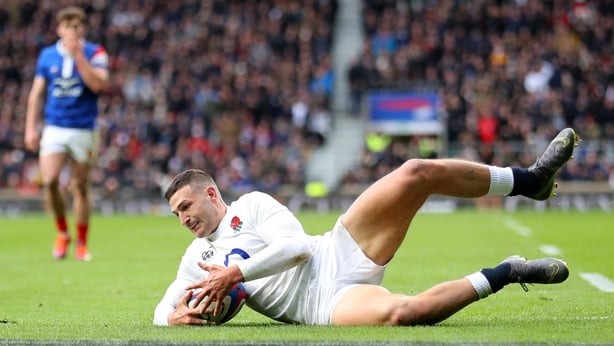
Is that stereotypical Gaullist disdain for Anglo-Saxon ways in the mix here?
As Charles De Gaulle (himself a big fan of old Ireland) didn't say, but could have, "Just because the Anglo-Saxons say this is the way to practice a set-piece doesn't mean they're f****n right."
Former Ireland and Leinster hooker Bernard Jackman, who coached Grenoble for several seasons in the Top 14, acknowledges that the French have a different attitude towards training than what they term the 'Anglo-Saxon' player.
He prefers to say 'different' as opposed to 'worse'.
"They’re different but that doesn’t mean they’re not good," he tells RTÉ Sport.
"They’ve got phenomenal athletes who can play but maybe they’re not as consistent as the Irish player.
"They call it the Anglo-Saxon mentality where the attitude is, if you want to play well on Saturday, it starts on Monday morning.
"For them, it starts maybe on Saturday. How they feel getting up, how they feel in the warm-up will dictate how they play.
"Whereas we like to believe there’s a process. They don’t really believe in a process as much as we do.
"But that’s across all French sports and it hasn’t stopped them being world champions in soccer, Olympic champions in handball, being elite in a lot of different sports.
"The French are very proud of their beliefs and culture and they don’t believe copying and pasting others is the right way to go.
"So, yeah, they don’t work as hard probably as Irish players but they would argue they don’t need to."
"The French are very proud of their beliefs and culture and they don’t believe in copying and pasting others is the right way to go.
They were certainly renowned for playing as hard.
Former Irish winger Niall Woods told this reporter that he entered the French dressing room to swap jerseys after Ireland’s 7-25 loss in the 1995 Five Nations only to be confronted with a thick fog of fag smoke as soon as he wandered in the door. (Always think of Mrs Doyle coughing and spluttering as she arrived home from her pilgrimage at the end of the Lent episode.)
The fact they were able to play that rugby after allegedly inhaling so many Gauloises at half-time was key to their charm.
"It’s more difficult because everyone else is very analytical, very professional," says Jackman. "The old days of the Blanco’s having a cigarette in the dressing room at half-time, they’re not doing that anymore.
"But they’re maybe a little bit late to the party in terms of the minute details around sports science, nutrition and everything else. On their day, though, they can compete."
Brunel, who looks like a fictional police detective in a quaint French village, is regarded as another problem. If he comes off like a nothing figurehead, that mightn't be an accident.
The cult of the coach is another foreign creation the French have never wholeheartedly embraced.
"They don't go in for the cult of the coach," says Jackman. "They don't call him a head coach. They call him a 'sélectionneur', which is a selector. He doesn't actually coach. Guy Noves never coached. He just picked the team and gave a pre-match speech.
"He (Brunel) knows French rugby but I don't think he's the best. I think that's a problem for France. I don't think they're getting the level of coaching that Ireland, England, Wales are getting.
"But I stress again, they do have phenomenal players."
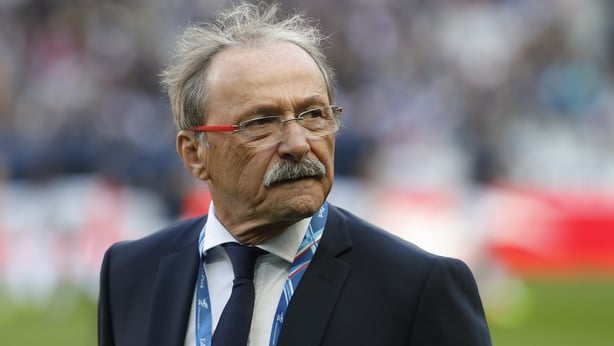
Since their first in 1968, France have won nine Grand Slams, more than anyone else. England and Wales have won six apiece, while Ireland and Scotland have two each.
Totting up 'championship' wins is a bigger rigmarole given the irritant of 'shared' wins - in 1973, all five nations shared the title after all registered two wins and two losses, making it rather hard, one imagines, to extract bragging rights from the whole affair.
But in the same period, France have 18 titles, four of them shared, compared to Wales's 14 (three shared) and England's 12 (one shared). Ireland are running in fourth with nine wins (two shares).
They're the only Northern hemisphere team to take out New Zealand in a World Cup, which they did twice.
Given that history, it's hard to see how they've stood over the fumbling about of the post 2011 era - without taking vigorous steps to remedy it.
Do they care enough?
"Most of the rugby is down the south. When they play in Paris, a lot of the Toulouse fans, the Bordeaux fans, the Perpignan fans wouldn't really always travel up to see it.
A recent article in the Demented Mole blog argued the true soul of French rugby lay not in the sight of the wispy and elegant backlines of yesteryear, but rather in the brutal inter-village rivalries in the south, where murderous looking forwards abounded and off-the-ball assaults were commonplace. The local, it implied, has always taken precedence over the national.
We see that reflected in the primacy of the club game in France which, according to the dominant narrative, has been prioritised to the clear expense of the national team.
Jackman points to a certain alienation from the national team among the rugby heartlands to the south.
"There's a massive divide in France between the clubs and the national team. A lot of supporters see the national team as a team that play in Paris.
"Most of the rugby is down the south. When they play in Paris, a lot of the Toulouse fans, the Bordeaux fans, the Perpignan fans wouldn't really always travel up to see it.
"It's a different type of crowd that follows the national team. The players down South don't even like going to Paris for a training camp."
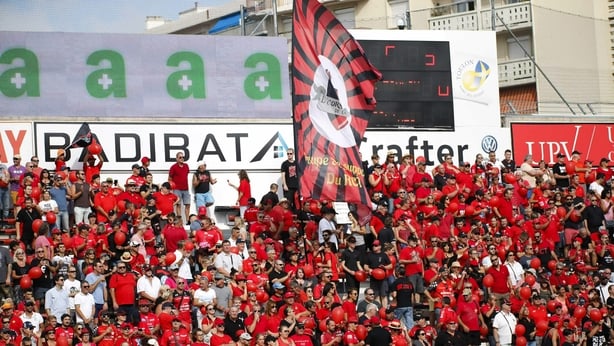
But the French have played in Paris in the 1970s and it didn't seem to inhibit them til recently. But Jackman says that French rugby man is left cold by the 80,000 seater stadium in St Denis.
"The Stade de France isn't the Parc des Princes. It's a bigger stadium but in the Parc des Princes, the crowd were right on top of you and France were brilliant there.
"There was a feeling there that the 40,000 fans who went to the Parc des Princes were real rugby people. Whereas, the Stade de France is more of an event crowd so the atmosphere isn't anywhere near as intimidating.
"And the French feed off that. For their clubs, they're used to playing at home in front of massively passionate fans. And then they go to the Stade de France and, okay it's full, but the crowd don't know rugby."
The severe nature of their indignity in Twickenham demanded something of a response against Scotland.
Brunel, 'the sélectionneur', sullenly fell back on his Plan B of picking players in their normal positions and it seemed to pay dividends. The new half back partnership of Antoine Dupont and Romain Ntamack inspired them to a 27-10 victory.
For the first time in his reign as coach, Brunel has named an unchanged side for Sunday. Their possible rejuvenation, combined with Ireland's off-colour performances, mean that nerves hang in the air ahead of the weekend.
Me: "Do you think they're turning the corner?"
Jackman: "The problem with them is... "
Me: "There's another corner around the next corner"
Jackman: "Yeah, there could be another crisis next week.
"But based on what I saw against Scotland, they're better organised. And when they're organised, they're dangerous."


